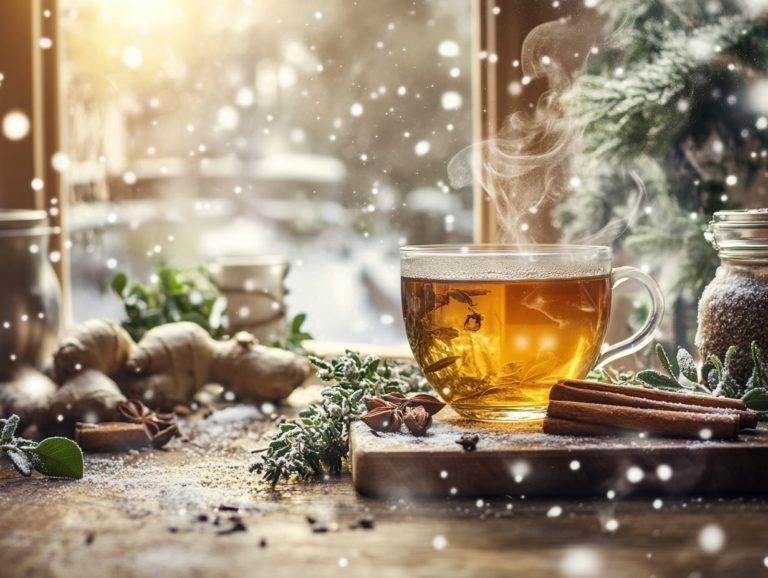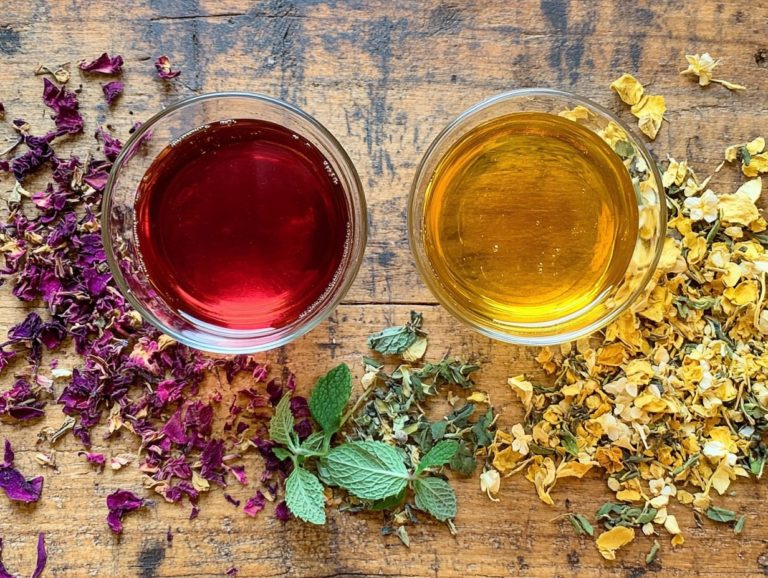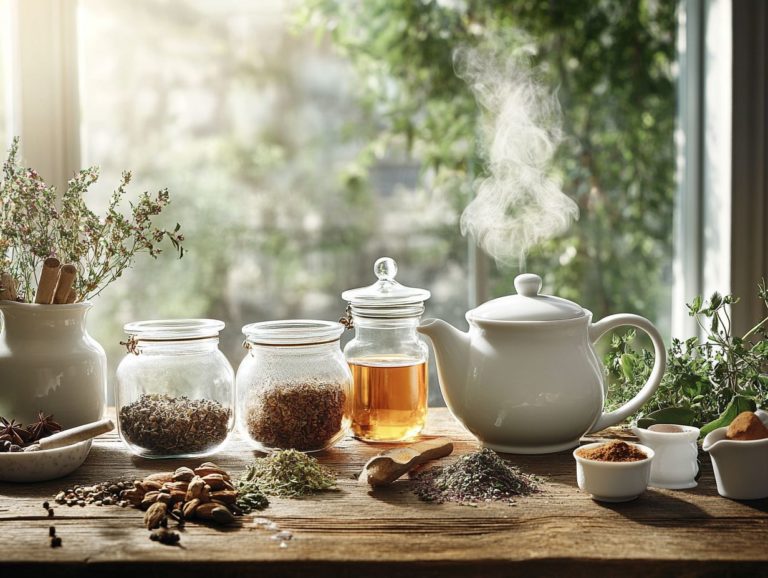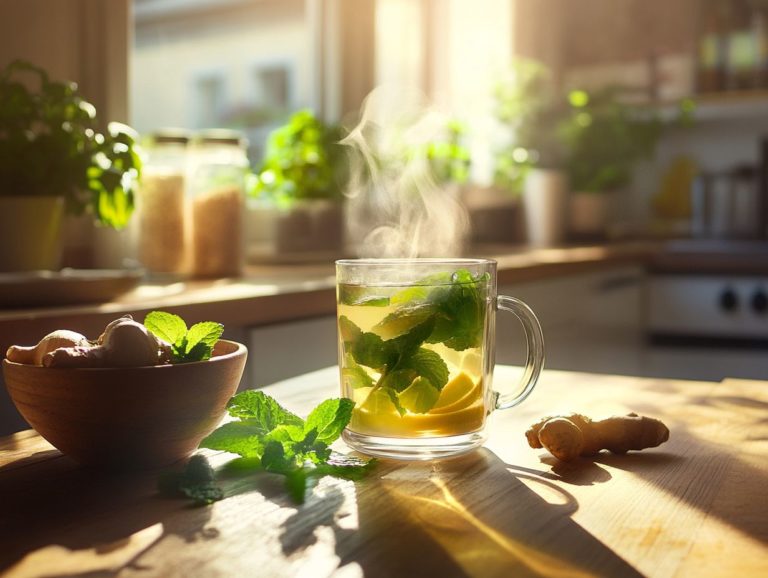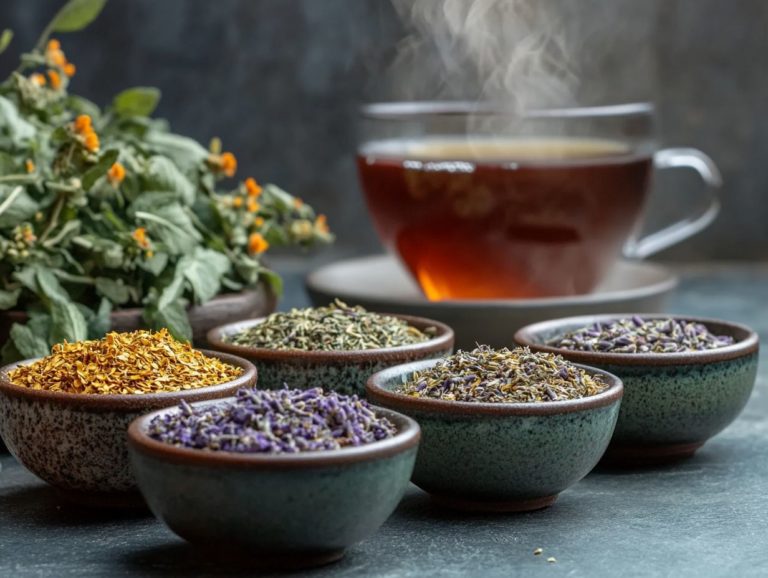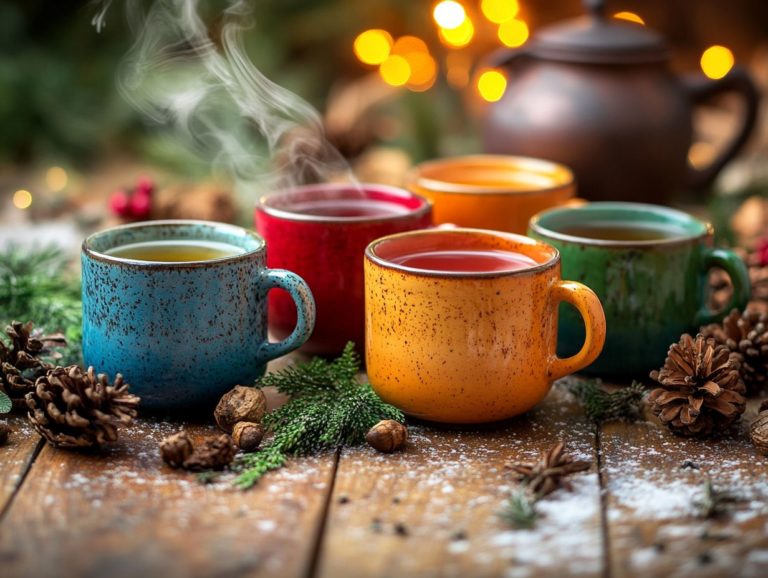How to Make Your Own Herbal Tea at Home
Herbal tea transcends mere refreshment; it represents a harmonious fusion of health benefits and comforting rituals, especially when exploring the art of homemade tea!
This article delves into the myriad advantages of herbal tea, including recipes and blend suggestions. It highlights the specific health properties of various herbs alongside a guide to popular varieties. You ll discover how to brew delightful cups in the comfort of your home, from making herbal tea blends to drying herbs. Plus, you’ll learn how to infuse them with unique flavors while staying informed about any potential risks associated with your choices.
Whether you re a seasoned tea lover or just beginning your journey with herbal remedies, there s something enriching here for everyone to explore!
Contents
Key Takeaways:
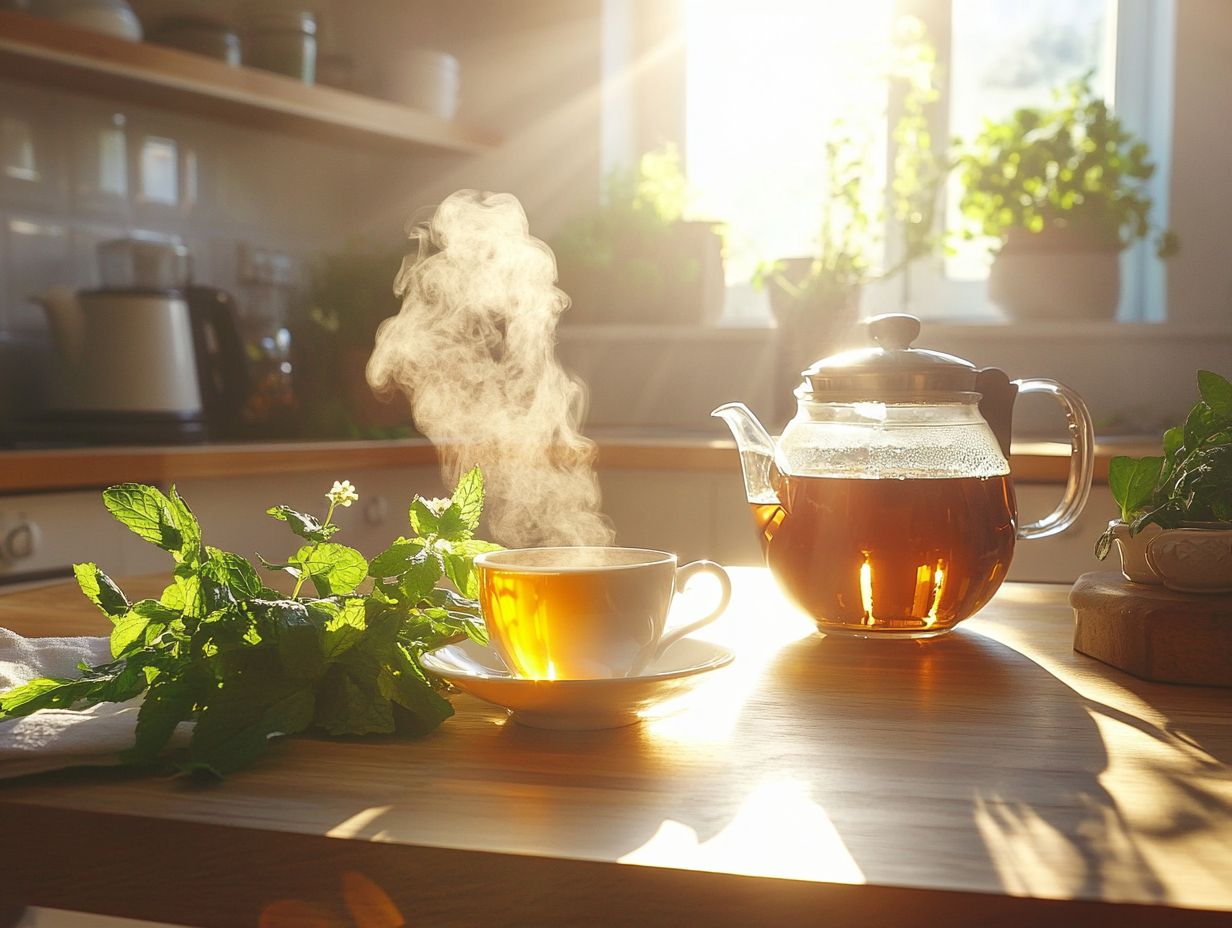
- Experiment with different herbs to reap their unique health benefits and create a personalized herbal tea blend.
- Save money and reduce waste by making your own herbal tea at home with simple brewing techniques, including drying herbs and using a food dehydrator for fruit.
- Customize your herbal tea by adding flavorful additions like honey, lemon, or spices to enhance the taste and potential benefits.
What is Herbal Tea?
Herbal tea is a delightful beverage crafted from brewing various herbal ingredients, including fresh herbs, dried fruits, and spices. This offers a multitude of flavor profiles that cater to every tea lover’s palate. Unlike traditional teas, herbal teas are caffeine-free, making them ideal for those seeking calming properties and soothing effects throughout the day.
You can enjoy this drink hot or iced. It presents an excellent opportunity for flavor experiments, allowing you to incorporate seasonal ingredients like mint leaves and chamomile flowers for freshness and vitality.
The origins of herbal tea stretch back to ancient civilizations, where natural ingredients were celebrated for their medicinal benefits and aromatic qualities. Unlike traditional tea, which is sourced from the Camellia sinensis plant, herbal tea draws from a vast array of botanical sources, including flowers like chamomile, leaves such as peppermint, and fruits like hibiscus.
Each ingredient contributes a unique taste and therapeutic properties, providing endless customization for your homemade brews. With a focus on natural flavors, you can explore different combinations, such as herbal blends and flavorful additions. This leads to a delightful experience that nurtures both body and soul.
Benefits of Herbal Tea
Herbal tea is celebrated for its multitude of benefits, offering a wealth of antioxidants and essential nutrients that bolster overall wellness and vitality. With various herbal blends crafted from ingredients like chamomile flower, ginger root, and hibiscus flower, you can experience specific health advantages from soothing digestive discomfort to promoting relaxation and improving sleep quality.
These delightful herbal remedies not only tantalize your taste buds but also play an essential role in cultivating a healthful drinking routine.
Health Benefits of Different Herbs
Different herbs used in herbal tea offer distinct health benefits, making them invaluable natural remedies for various ailments and conditions. For instance, you might find chamomile to be a favorite for its calming effects, while ginger root is well-known for aiding digestion and easing nausea.
Mint leaves and lemon balm not only provide refreshing flavors but are also recognized for their soothing properties, allowing you to embrace a holistic approach to health.
Lemongrass is a fantastic choice for its antibacterial and anti-inflammatory benefits, supporting your immune function and enhancing the effectiveness of your herbal blends. Hibiscus tea, packed with antioxidants, has been linked to lowering blood pressure, contributing positively to cardiovascular health.
Studies have shown that passionflower can help alleviate anxiety, serving as a natural alternative to conventional medications.
When combined, these herbs create soothing teas that not only offer comfort but also promote your overall well-being, showcasing the remarkable power of nature in nurturing health.
Why not brew your first cup today?
Types of Herbal Tea
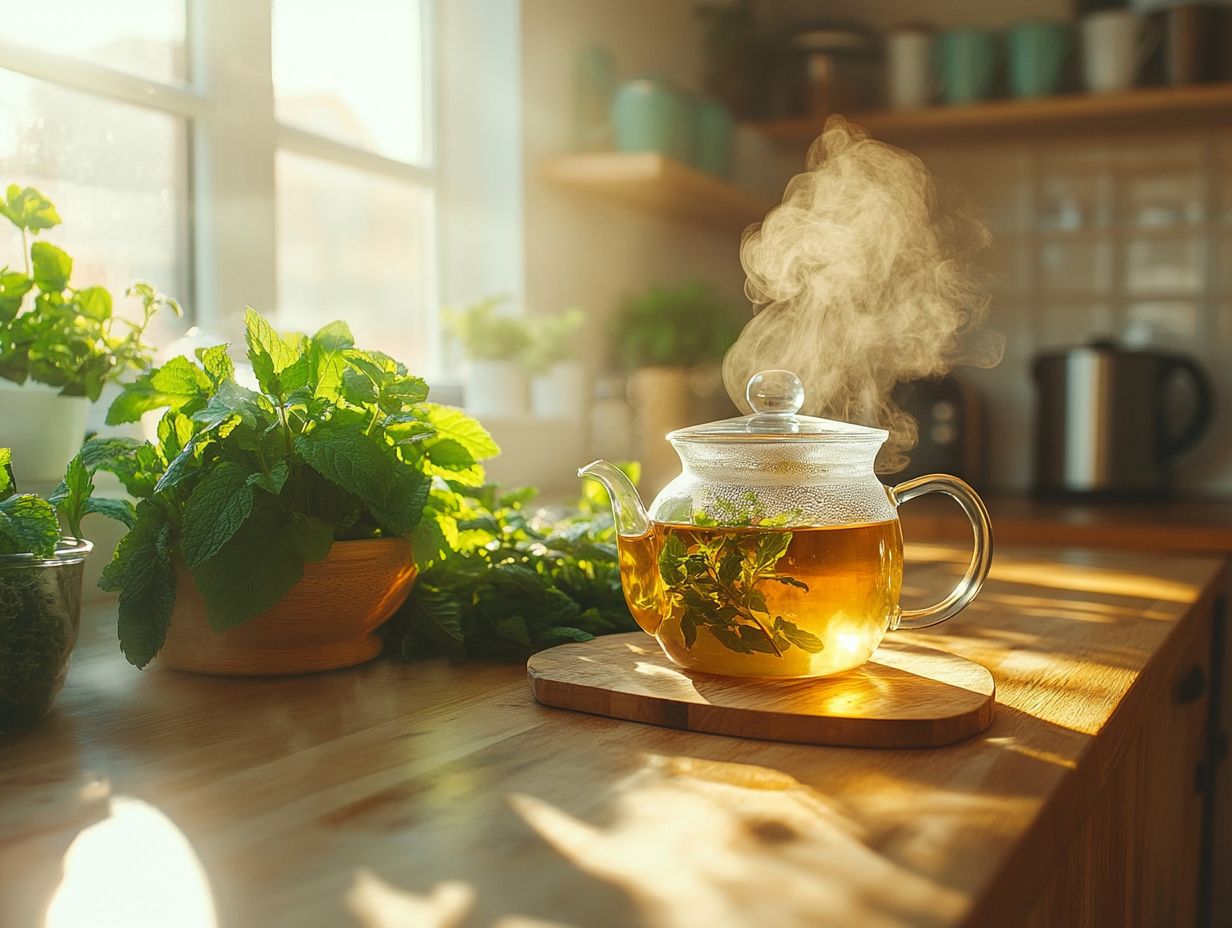
You ll discover a delightful variety of herbal teas, each presenting its unique flavors and benefits from the soothing embrace of chamomile, known for its calming properties, to the vibrant energy of hibiscus and the refreshing notes of mint.
Herbal blends often combine an array of ingredients, like ginger root for a warm kick, peppermint for a cooling touch, and lemon balm for an uplifting boost. Explore diverse flavor combinations that cater to your personal taste!
This rich selection makes herbal tea an enticing choice for everyone, whether you re a casual drinker or a dedicated enthusiast.
Overview of Popular Herbal Teas
Some of the most beloved herbal teas include chamomile, renowned for its soothing effects, ginger for its delightful warmth, and peppermint, which offers a refreshing coolness. Each of these infusions boasts distinctive flavors and health benefits, making them favorites among tea lovers.
Hibiscus tea shines with its tart flavor and vibrant hue. Raspberry leaf and lemon balm also introduce unique twists to cater to your diverse taste preferences.
These herbal brews tantalize your palate and provide numerous health advantages. Chamomile promotes relaxation and aids sleep, while ginger is celebrated for its anti-inflammatory properties. Peppermint is a fantastic choice after meals, as it can help with digestion.
Hibiscus tea is brimming with antioxidants and may assist in lowering blood pressure, while raspberry leaf has a long-standing reputation for supporting women s reproductive health. With its gentle lemony flavor, lemon balm is sought after for its calming properties, enriching the world of herbal teas and their extensive applications in your daily wellness routine.
How to Make Herbal Tea at Home
Making herbal tea at home is a fun and rewarding experience! You can create personalized blends using fresh or dried herbs, spices, and even dehydrated fruits for a burst of natural flavor. Begin by choosing your favorite herbal ingredients, such as fresh herbs and dried fruits, and pay attention to their quality and freshness.
Let boiling water work its magic by extracting the rich flavors and benefits from the herbs. Remember, how long to let the tea sit is crucial it s the key to achieving the perfect intensity and taste. This way, you can enjoy a comforting cup of homemade tea whenever you like.
Step-by-Step Guide to Brewing
To brew the perfect cup of herbal tea, start by boiling water to the ideal temperature; this ensures effective flavor extraction from your chosen herbal ingredients. Measure out your herbal blend whether fresh or dried and let it steep for the recommended time to achieve a harmonious flavor profile.
Proper tea storage is essential. Exposure to air and light can diminish the potency of your herbs. Choosing high-quality water is paramount, as it significantly influences the taste of your final brew; filtered or spring water is often preferable over tap water, which may contain chlorine or other unwanted impurities.
Timing varies based on the type of herbs you’re using. Some may need just a few minutes, while others benefit from a longer steep to fully extract their flavors and beneficial properties.
Store both dried and fresh herbs in airtight containers, away from direct sunlight and moisture, to preserve their flavor and efficacy. This attention to detail allows you to enjoy a consistently delightful cup of tea every time.
Tips for Enhancing Your Herbal Tea
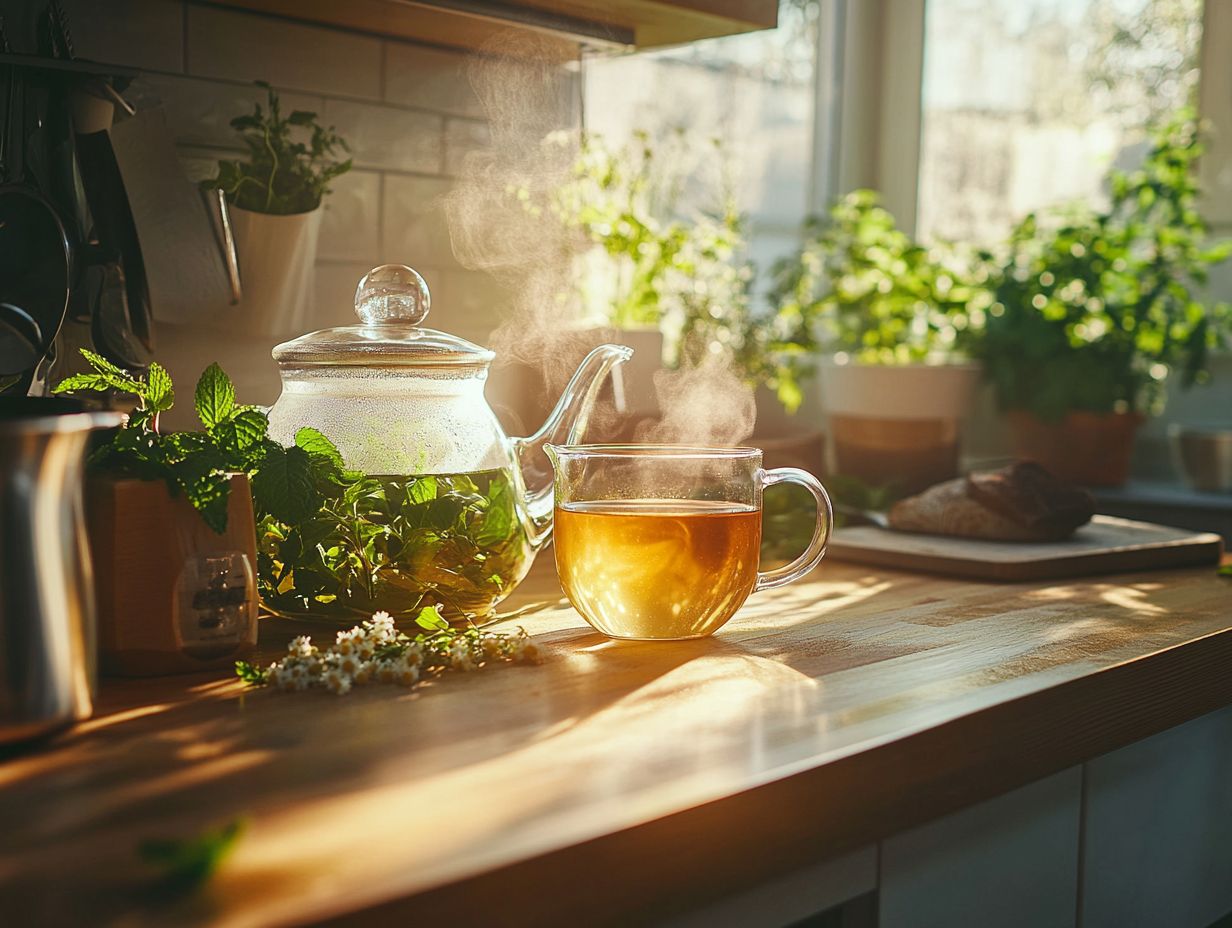
Elevating your herbal tea can transform your drinking experience into something exceptional. You can enrich both flavor profiles and therapeutic benefits with a range of enhancements.
Imagine infusing your tea with sweet herbs like peppermint or lemon balm for a refreshing burst, or adding a cinnamon stick to introduce warmth and complexity.
Explore the world of dried fruits or essential oils, and discover endless possibilities for unique flavor combinations that align with your personal taste and wellness goals.
Additions and Flavors to Try
When enhancing your herbal tea, consider various additions like sweet herbs or spices. These can create exciting flavor combinations that delight your palate. Popular options include dried fruit for natural sweetness and essential oils for concentrated flavors.
You can also blend different herbal ingredients for a unique twist. This experimentation allows you to tailor your tea to suit your tastes and health needs.
Think about incorporating spices like cinnamon or ginger; they can elevate both flavor and health benefits. They add a warming element that aids digestion and boosts your immune function.
A hint of citrus, such as lemon or orange zest, can brighten the overall experience, infusing it with a fresh aroma and a generous dose of vitamin C.
Don t overlook the calming effects of chamomile paired with mint for a soothing brew that promotes relaxation.
These blends not only enhance your sensory experience but also offer numerous health benefits, making each cup a delightful choice for both your mind and body, especially for tea lovers who appreciate various flavor profiles.
Possible Risks and Precautions
While herbal tea can provide many benefits, stay aware of potential risks and precautions associated with certain ingredients, especially if you have allergies or specific health conditions.
Some herbal remedies may interact with medications or lead to undesirable effects. It’s essential to be well-informed about the herbal components in your brew.
Always check the safety of a herbal tea before you sip it!
Safety Considerations and Allergies
Safety is paramount when indulging in herbal tea, especially for those with known allergies or health conditions that certain herbal ingredients might aggravate. Some herbs can cause reactions that may range from mild irritation to serious allergies, so it s essential to be cautious and well-informed.
Always take the time to research the herbs in your tea blends. If you have allergies, be wary of herbs like chamomile flower, which is part of the daisy family and may trigger reactions in those sensitive to pollen. Mint leaves could also irritate some individuals.
If you have high blood pressure, exercise caution with herbs like licorice root, as it s known to raise blood pressure levels.
Consider how herbal ingredients can interact with medications. For example, St. John s Wort can influence the effectiveness of prescription drugs, similar to how ginger root can affect blood thinners. Gaining a comprehensive understanding of your health status and potential herbal interactions can significantly enhance your safety and wellness benefits when savoring these natural beverages.
Frequently Asked Questions
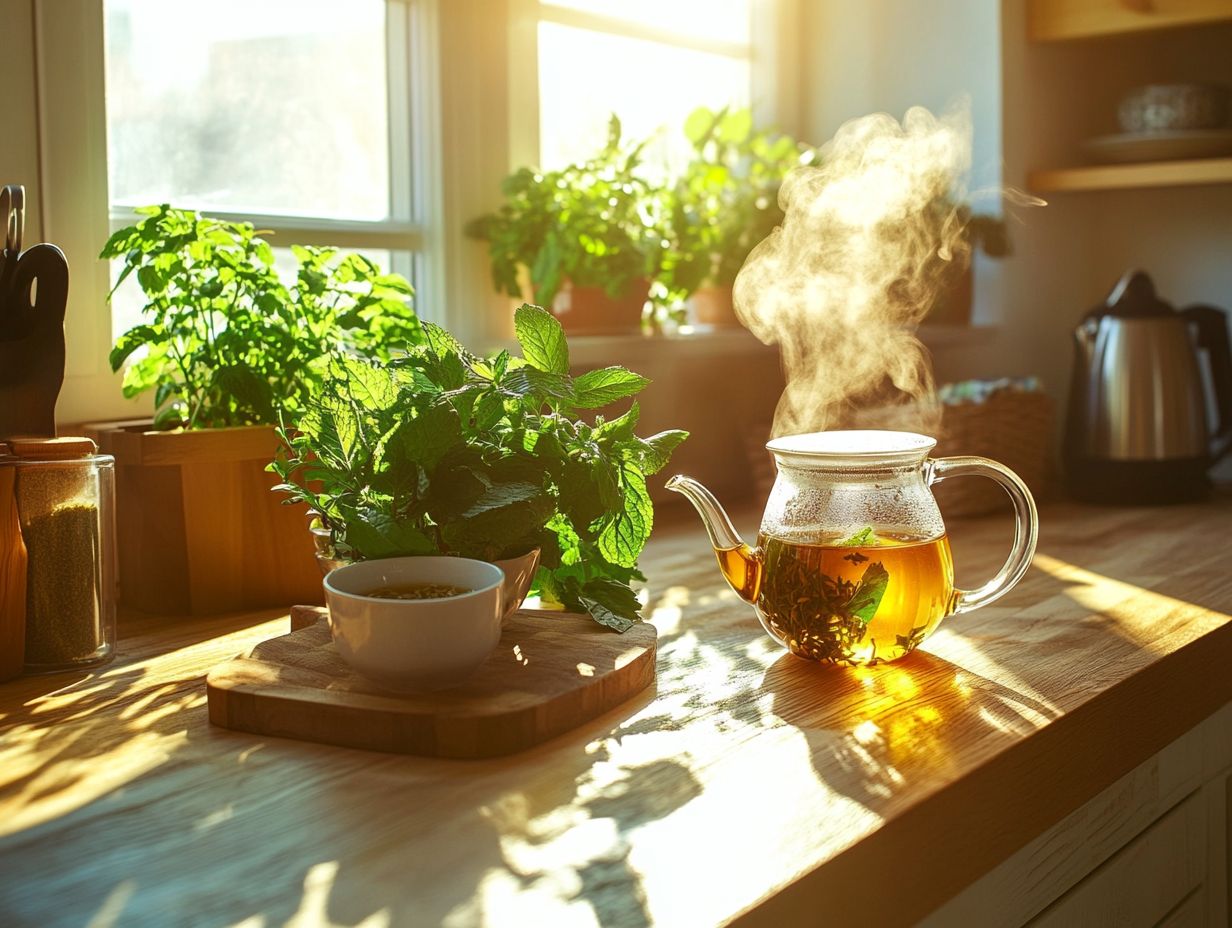
Have more questions? Feel free to ask or explore more about herbal teas!
What are the benefits of making your own herbal tea at home?
Making your own herbal tea gives you control over the ingredients. You can choose seasonal ingredients for a healthier and personalized drink.
You can save money and reduce waste by avoiding pre-packaged teas.
What are some common herbs used in herbal tea?
Some common herbs used in herbal tea include chamomile, peppermint, ginger, lavender, and hibiscus flower.
These herbs not only taste great but also bring various health benefits to your cup.
How do I make herbal tea at home?
To make herbal tea at home, gather your desired fresh herbs, hot water, and a tea infuser or strainer, focusing on boiling water for the best extraction.
Place the herbs in the infuser/strainer and pour hot water over them. Remember that steeping time is how long you let the herbs sit in water for the best flavor extraction.
Let it steep for a few minutes before removing the herbs and enjoying your homemade herbal tea.
Can I mix different herbs together to make my own blend of herbal tea?
Absolutely! Mixing herbs can lead to delightful new flavors. Just remember to research their ratios for a well-balanced blend.
Can I sweeten my herbal tea?
Yes, you can sweeten your herbal tea with natural sweeteners such as honey, agave, or stevia. You can also add a slice of lemon or a dash of cinnamon for added flavor.
Can I use fresh herbs from my garden to make herbal tea?
Absolutely! Fresh herbs from your garden can make a delicious and potent herbal tea.
Be sure to wash them well before using; then, enjoy the burst of fresh flavor!

